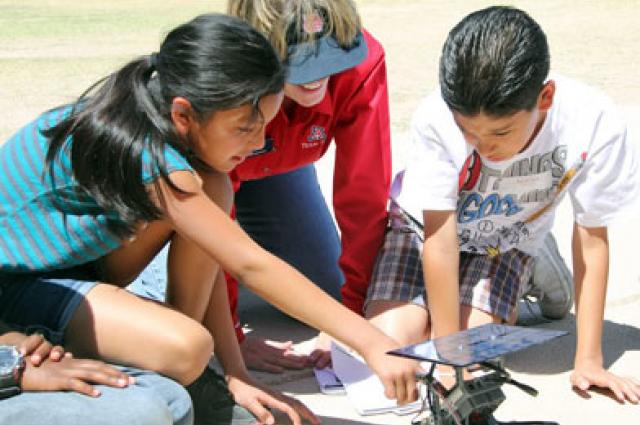Solar Powered Lego Robot Workshops Are a Hit with Students and Teachers
A teaching concept that lets students power up Lego robots by retrofitting them with mini solar panels is making its way out of the development stage as an effective hands-on robotics workshop with an alternative energy twist.
"Bringing the Lego robots to life using solar power is lending yet another cool aspect to the Legos, which are already great at generating interest in robotics and computer applications for students with a wide variety of backgrounds and interests," said Jane Hunter, associate director of the engineering management program at the University of Arizona and solar robots program coordinator.
The new student workshops are using solar-powered Lego robots not only for developing early interest in robotics, they're building new interest in solar energy and the engineering challenges surrounding solar as a reliable, consistent energy source, Hunter said.
The solar-powered Lego robots were a hit with students at Los Ninos Elementary School in Tucson's Sunnyside Unified School District. Workshops consisted of 5th graders who were the winners of a classroom writing contest on why they should be selected for a solar robots workshop. UA College of Engineering photo/Steve Delgado.
"We're excited that the kids are responding well. Their faces light up when they see the robots running on the power of the sun," she said. "They gain an appreciation for some of the challenges that engineers and scientists face when working with solar energy. Challenges like storage: Unless you have a method to store the energy, it must be used immediately."
Lesson plans specifically developed for the solar robots workshop by UA Engineering call for participants to spend time examining reasons to care about solar energy, including discussions about some of the long-term disadvantages of nonrenewable sources of energy, and some of the possible reasons behind the fact that less than one percent of the energy consumed by the nation comes from solar.
"It's important for students to start thinking about renewable energy sources as an alternative to fossil fuels," Hunter said. "We want them to think critically about these issues, and not just the technical side, but the issues in the larger context."
The solar robots workshops use Lego Mindstorm NXTs, the same robots featured each spring by the UA Roboclub at the Tucson Festival of Books science pavilion. The robots are retrofitted with dSolar 4W System solar panels, technology developed in 2010 by Stafford, Va.-based Dexter Industries, a maker of advanced sensors for Lego Mindstorm robots.
"A lot of folks are talking about electric cars and alternative sources of energy, and I thought it would be really cool to start powering robots with solar power," said Dexter Industries founder John Cole, on getting the idea of solar-powered Lego robots. "There are a lot of challenges to using solar, and I thought it would be useful for students and educators to get some real-world hands-on experience in actually powering something with solar," he said.
This spring, the UA College of Engineering conducted two student workshops at Los Ninos Elementary School in Tucson's Sunnyside Unified School District. Workshops consisted of two groups of 5th graders who won their seats in the workshop via a classroom essay-writing contest on why they should be selected for a solar robots workshop. The students who wrote the best essays were selected.
The solar-powered robots were also a highlight at the American Society for Engineering Education 2012 Annual Conference K-12 workshop. Educators from universities and K-12 schools around the country were introduced to the solar robots workshop concept at the ASEE workshop, with many planning to adopt the materials, including the lesson plans that are now ready for use.
The workshop provides National Science Standards-based curriculum in a hands-on format, and falls within recent engineering-focused standards established by the National Science Teachers Association, or NSTA, said J. Jill Rogers, Engineering 102 for High School coordinator and co-coordinator of the solar robots workshop program.
"Kids, robots and sunshine together make for a winning combination, where robust learning is embedded in the excitement of the lessons," Rogers said.
The UA solar robots workshops are part of the iSTEM Project, a program designed to engage youth in science, technology, engineering and math-based activities. iSTEM is supported by a $1.2 million NSF iTEST grant awarded to the University of Arizona Southwest Institute for Research on Women, or SIROW, which is collaborating with both the UA engineering and education colleges.
In the fall of 2012, the UA College of Engineering will present the solar robots workshop for students and mentors participating in the iSTEM project. And the solar robots are also scheduled to be part of the activities offered in the college's Summer Engineering Robotics Camp in 2013.
Rogers said that in addition to the mentors' workshop, the College of Engineering can also provide interested middle and high school teachers with the solar robotics lesson plans developed under the iTEST grant.
Hunter likes the momentum of the solar robots program and its strong base of science, technology, engineering and mathematics curricula. "This is an effective program where we can portray engineering as a helping profession that improves people's lives," Hunter said.
More information on the UA SIROW iSTEM program can be found here: http://uanews.org/node/45937.
More information about the solar robotics lesson materials is available via email at jjillrogers@email.arizona.edu.
More information on the dSolar 4W System solar panels by Dexter Industries is here: http://www.dexterindustries.com/Products-dSolar.html.
And more information on the UA Summer Engineering Robotics Camp can be found here: http://engr.arizona.edu/future/index.php?ID=75
Educators from schools around the country were introduced to the solar robots workshop concept at the ASEE 2012 Annual Conference K-12 workshop. UA College of Engineering photo.


